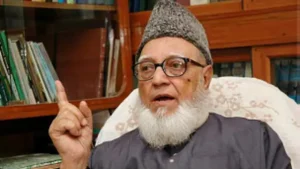
Foreign Policy: Biden was deeply involved in shaping U.S. foreign policy, particularly in regard to NATO, the Iraq War, and conflicts in the Balkans. He played a key role in the 2001 Authorization for Use of Military Force after the 9/11 attacks, as well as in pushing for the 2009 Iraq withdrawal agreement.
Crime Legislation: Biden was a central figure in the passage of the Violent Crime Control and Law Enforcement Act of 1994, which addressed issues such as crime prevention and law enforcement funding. However, the act’s “three strikes” provision and mass incarceration policies have been heavily criticized in later years.
Judiciary Committee Leadership: Biden chaired the Senate Judiciary Committee for many years, where he was instrumental in overseeing Supreme Court nominations and legislation concerning civil rights, women’s rights, and other critical social issues. Notably, he presided over the Clarence Thomas confirmation hearings in 1991, which included controversial allegations of sexual harassment.
Longstanding Commitment to Delaware:
Biden was known for his dedication to his home state of Delaware, often emphasizing his connection with the people and issues of his state. His work on local issues, such as financial regulation and environmental protection, helped maintain his popularity in Delaware.
Political Style:
Biden was widely regarded as a moderate Democrat during his Senate career. He was known for his ability to work across party lines, forging compromises and relationships with Republican colleagues. His political style was marked by his willingness to negotiate and find bipartisan solutions.
Legacy in the Senate:
By the time he left the Senate to become Vice President in 2009, Biden had become one of the most influential and respected members of the Senate. His experience in international relations, his work on judicial appointments, and his ability to navigate complex legislative issues helped cement his reputation as a skilled and effective legislator. His tenure in the Senate laid the foundation for his eventual run for the presidency
Joe Biden’s War Policy:
Joe Biden’s approach to war and military conflict has evolved over the course of his long career in politics, shaped by his experiences as a U Senate legislator, as Vice President under President Obama, and now as President of the United States. His war policy reflects a mix of diplomacy, multilateralism, and selective use of military force, with a strong emphasis on reducing unnecessary conflicts while maintaining American leadership in global security.
1. Military Intervention and Diplomacy:
Biden has generally preferred diplomatic solutions to military intervention, believing that the U.S. should use force as a last resort. However, he has also supported military interventions when he believed they were in the national interest or part of international security objectives.
Iraq War (2003): Biden, then a U.S. Senator, was initially a strong supporter of the Iraq War, voting for the 2002 resolution that authorized the use of military force against Iraq. However, he later became an outspoken critic of the way the war was conducted and of the lack of a clear post-war strategy. As Vice President, Biden advocated for the withdrawal of U.S. troops from Iraq, and the 2009 Iraq withdrawal agreement was signed during the Obama administration.
Afghanistan War: Biden’s stance on Afghanistan was one of cautious support for the intervention. However, he consistently emphasized the need for a clear exit strategy. As Vice President, Biden was part of the administration’s decision-making process to reduce U.S. involvement in Afghanistan. When Biden became President, he made the historic decision to withdraw U.S. forces from Afghanistan in 2021, ending America’s longest war. The withdrawal was controversial, especially because of the rapid Taliban takeover, but Biden defended the decision as a step toward ending an “endless war” and focusing on other strategic priorities.
2. The War on Terror (Global Counterterrorism Efforts):
Biden has consistently supported efforts to combat terrorism globally, with a particular focus on al-Qaeda and, later, ISIS. As Vice President, he played a significant role in the Obama administration’s counterterrorism operations, including the operation that killed Osama bin Laden in 2011.
Biden has endorsed the continued use of drone strikes and special operations forces in counterterrorism efforts, particularly in regions like Syria, Yemen, and Somalia. He has advocated for precision strikes and intelligence-based operations to target terrorist organizations while minimizing civilian casualties.
While Biden recognizes the need to fight terrorism, he has also been cautious about nation-building and prefers focused counterterrorism operations over long-term military occupations.
3. U.S. Military Alliances and Multilateralism:
Biden believes in the importance of alliances and multilateralism in global security. He has repeatedly stated that the U.S. should work closely with NATO and other international organizations to address global security challenges.
Biden has been a strong advocate for NATO and has worked to rebuild and strengthen relationships with U.S. allies, particularly after the tension and division under President Trump’s “America First” policy.






